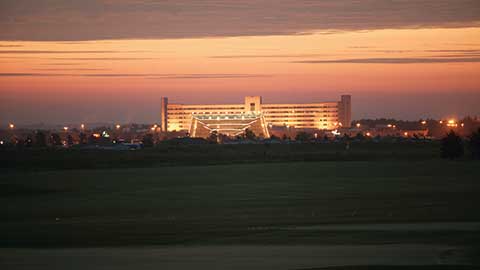Our Economy
Mille Lacs Band members have always contributed to the economy of East Central Minnesota. When the Band had very little money or support from state and federal governments, Band members worked in traditional enterprises, creating and selling crafts and food products like maple syrup and wild rice, and working in the logging, agriculture and fishing/tourism industries.
As development occurred and sovereignty was strengthened, the Band operated resorts, manufacturing programs, schools and a growing government and housing infrastructure.
Today, Mille Lacs Corporate Ventures oversees the Mille Lacs Band’s business enterprises, including gaming and non-gaming businesses, to assure a secure economic future for the tribal members living both on the reservation and in other Minnesota communities. The Mille Lacs Band’s Commissioner of Corporate Affairs is appointed by the Chief Executive and ratified by the Band Assembly to oversee Mille Lacs Corporate Ventures.
Before the casinos, the unemployment rate on the Mille Lacs Reservation was more than 80 percent, making it one of the poorest reservations in the nation. Today, the unemployment rate is approximately 14 percent.
For decades, the Mille Lacs Band’s leaders have shared a vision for diversifying the Band’s economy beyond gaming, and the Band’s non-gaming businesses are steadily becoming an increasingly important part of the Band’s economic enterprise.
Gaming
In 1987, the U.S. Supreme Court reaffirmed the 1825 Supreme Court decision on tribal sovereignty and ruled that as sovereign nations, American Indian tribes could operate gaming casinos on their reservations. In 1988, Congress enacted the Indian Gaming Regulatory Act which established rules for Indian gaming operations. In 1989, as a means to create jobs for Indian people, Minnesota Governor Rudy Perpich, Attorney General Hubert H. Humphrey III and Minnesota legislators worked together to create a gaming compact with American Indian Tribes in Minnesota. The compact was intended to further develop on-reservation economies and create additional economic opportunities for tribes in Minnesota.
Tribal gaming has been a critical economic tool, not only for the Mille Lacs Band but also for the surrounding communities in east central Minnesota. Since opening Grand Casino Mille Lacs and Grand Casino Hinckley in 1991 and 1992, the Mille Lacs Band has become one of the largest employers and taxpayers in the region.
Although sharing gaming revenues is enough to help our members, neighboring communities, and local charities, it is not enough to make anyone wealthy. Only a few small tribes in the United States have become wealthy due to gaming; they are located near large urban markets and have smaller memberships.
Other Businesses
Band members agree that survival today means competing in the American economy and achieving economic self-sufficiency through diversifying the tribal economy. The success of Grand Casino Mille Lacs and Grand Casino Hinckley has provided the Mille Lacs Band opportunities to grow nearly 30 new businesses, including banks, hotels, childcare centers, resorts and a golf course.
In recent years, the Economic Development Team for Mille Lacs Corporate Ventures has created a strategic plan with a focus on the hospitality industry. When considering new investments, the Band considers how its decisions will affect the next seven generations. It’s all about sustainability — making decisions that ensure the investments can support their people for generations to come.
The Band is dedicated to fostering sustainable economic development opportunities throughout East Central Minnesota. Through Mille Lacs Corporate Ventures, the Band’s businesses contribute to the local economy, support tourism in the region, and help spur economic development.

